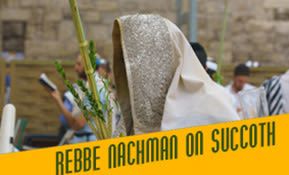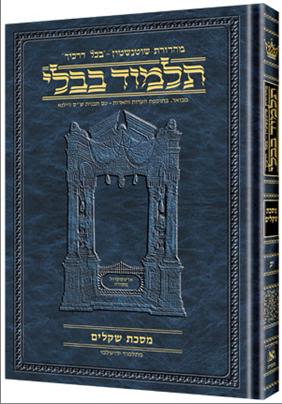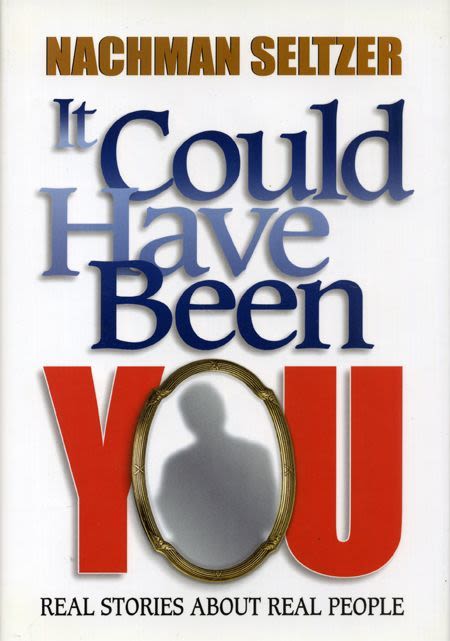
A Strange Vision
The entire scene was not real. There were no butcher shops, no customer, and no streets. It was a vision with an important message to convey...

A Strange Vision
Once, Rabbi Yehoshua ben Levi was traveling with Eliyahu the prophet (Elijah the prophet). They entered the market place of a town and found themselves on a street that was almost deserted. Rabbi Yehoshua saw a butcher shop and went inside. He saw that it was clean and well-lit, and the meat was of the highest quality. In addition, the prices were extremely low. Nevertheless, there were very few customers. They continued on and came to another street that was very crowded. There, too was a butcher shop, but it was dark and filthy. Instead of beef it sold rancid dog’s meat at an absurdly high price. Yet there were hundreds of people at the door, pushing and shoving to get in.
Needles to say, Rabbi Yehoshua was shocked. What was going on here? Had these people gone mad?
He turned to Eliyahu, who revealed the truth to him. The entire scene was not real. There were no butcher shops, no customer, and no streets. It was a vision with an important message to convey. The clean butcher shop, with its high-quality meat, was a symbol for the mitzvot, which are healthy and enjoyable and easy to acquire in this world. Nevertheless, there are only a few customers. The other butcher shop, with its rancid meat, was a symbol for the evil inclination, whose foul and unhealthy merchandise always makes the buyer pay dearly in the end. And yet, there are many hungry customers clamoring to buy (Rabbi Chaim Dovid Azulai, Lev Dovid, quoting a Midrash).
How do we show someone that he is in the wrong store, and that he has mistaken filth for purity? How do we redirect him to a way of life that is good and healthy? That is the job of a true teacher, one who can bring a precious fragrance to the soul of his listener.
The Voice of Holiness
Rebbe Nachman writes: … and (the ability to) repair depends upon the “voice” for that is the voice that waters the Garden… and that is (the river mentioned in the verse:) “and a river went out from Eden to water the Garden” (Bereishit 2:10) Likutey Moharan 11:8.
These lines describe the lofty spiritual quality of rebuke when it is given by a person who is worthy. We can begin to understand this with the Zohar’s statement that there are different types of souls; some are like trees and some are like grasses. They all grow in the Garden, and when they drink from the river that flows from Eden, they grow and blossom and flourish.
Rebbe Nachman continues:
…The “river that goes out from Eden” is the voice (of a person who is worthy to give rebuke), as the verse says: “the rivers have lifted up their voices” (Tehillim 93:3). And (we can understand this together with the verses:) “I heard Your voice in the Garden, and I was afraid” (Bereishit 3:10), and, “The voice is the voice of Yaakov (Jacob)” (ibid 27;22).
The voice of a person who is worthy to give rebuke is a voice of holiness, a voice that “goes out from Eden.” Such a voice has the power to inspire a listener with a fear of heaven. It is truly “the voice of Yaakov,” and if we want to admonish someone, we must first develop this voice.
Last Will and Testament
Our discussion of rebuke is based on Lesson II:8, which is one of the longest and most complex discourses in Likutey Moharan. Rebbe Nachman taught this lesson on Rosh Hashanah, in the year 5571 (1810), only eighteen days before he passed away (on the 18th of Tishrei). He gave the lesson towards evening, between the first and second days of Rosh HaShanah, which was the time when he normally spoke each year. That year, however, Rebbe Nachman was extremely weak: his lungs had been eaten away by tuberculosis, and he was spitting up large quantities of blood. No one imagined he would have the strength to speak. The very fact that he was able to leave his study to address the chassidim was seen as a sign of extraordinary Divine mercy. The room was crowded with a thousand men, and Rebbe Nachman had to sit next to the door to his study, so he could be taken out quickly if he fainted. Yet he somehow found the strength to teach for several hours without interruption. On his part, it was literally an act of self-sacrifice, as he hinted when he said: “I am giving my life for this.” The fact that he was able to deliver such a long and complex discourse was described by Reb Nosson as “a wondrous miracle” – a miracle that gave us this wondrous lesson, which is Rebbe Nachman’s last will and testament for future generations.
A Song of Renewal
In Lesson II:8, which was Rebbe Nachman’s final message to his chassidim, he explains that just as God originally created the world with ten utterances, so will He renew it, in the future with a “song” that contains ten different “melodies.” This song of the World to Come will bring a new life to the entire world. It will have the power to revive the dead, and, all the more so, to revive the living. The song, which is called “single, double triple, and quadruple,” (See Tikkunei Zohar, #21, 51b) will include ten different types of song, and it will be played on a “harp of seventy-two strings.”
All of this alludes to Kabbalistic ideas. What it means is that in the World to Come, there will be a revelation of one of the holiest Names of God. The letters of every Divine Name can be written out in many different ways (See Kisvei Ha-Arizal, Etz Chaim, sha’ar 18, chapter 2). In this case, the four letters of God’s Name are written out as follows: yud (single), yud-kay (double), yud-kay-vav (triple), yud-kay-vav-kay (quadruple). The resulting Name has ten letters, and the numerical value of all the letters together is seventy-two strings.”
The prophet Yeshayahu (Isaiah) was told: “Raise your voice like a shofar (kaShofar) and speak to My people about their sins…” (Yeshayahu 58:1). From this we see that in order to speak to the Jewish people about their sins, one must have a voice “like a shofar” (kaShofar). When we examine the Hebrew word kaShofar, we find that it consists of the four letters: peh, kuf, shin, and reish, which are the first letters of the Hebrew words: pashut (“single”), kaful (“double”), shalush (“triple”), and ravu’ah (“quadruple”). In other words, a person who gives rebuke must have a “voice of holiness” that is drawn from the song of the World to Come. Like that son, it must be a voice that brings life and renewal to all who hear it. It must fill the listener with delight and with a new awareness of God. Only with such a voice can one give rebuke.
The Power of Rebuke with Love
The yeshivah of the Chofetz Chaim was once on the verge of closing due to a lack of funds. When the seriousness of the situation became known, a number of wealthy individuals stepped forward to save the yeshivah. One of the richest men in the community, a man whose business was open Shabbat, offered the Chofetz Chaim a very large donation. When the Chofetz Chaim saw how much the man was ready to give, he started crying.
The businessman thought the Chofetz Chaim was crying because the sum wasn’t enough to save the yeshivah, so he opened his wallet and doubled the amount. But the Chofetz Chaim continued to cry. The man tripled the amount, and the sound of the Chofetz Chaim’s weeping became even louder and more heartbreaking. Finally, the man said, “Rebbe, do you realize what a large amount of money I am offering your yeshivah? Why are you crying?”
“I’m not crying about the money,” replied the Chofetz Chaim. “I’m crying because it tears my heart to pieces to realize that those generous, golden hands of yours are going to burn in hell because of the way you desecrate the Shabbat. I can’t bear such a thought.”
When the rich man heard these frightening words, spoken from a heart that was sincerely filled with pain and love for another Jew, he immediately decided to change his ways, and began to observe the laws of Shabbat. It was not just the words of the Chofetz Chaim that affected him; it was the voice, the tone of deep compassion and love. He heard the voice of a broken heart that was truly concerned for his own welfare – and that is what moved him to change the direction of his life.
In Rebbe Nachman’s words: “A person who admonishes his friend for the sake of heaven, draws upon him a thread of love (chesed).” Since the numerical value of the word chesed is seventy-two, this alludes to the “harp of seventy-two strings” and the song of the World to Come. In other words, when a person with pure motives speaks words of rebuke, his listener will hear strains of music from the World to Come. The Chofetz Chaim allowed the man to hear such music, and that is what caused him to repent.
Practical Advice
But not everyone has the pure heart, the sincerity, and the genuine compassion of the Chofetz Chaim. What can an ordinary person do to “draw down a thread of love” in order to help another Jew? There is one bit of practical advice that can help, and anyone can do it: we can read and share with others the words, teachings, and stories of the holy Sages and Tzaddikim of earlier generations. Their hearts were filled with genuine compassion and pity, and their words were uttered with Divine inspiration. Hence if we set aside our own personalities and function as a mouthpiece and a messenger for the Sages, we will bring their voice to the listener – and their voice is a “voice of holiness”, a voice of inspiration and encouragement. If one does this for the sake of God, in order to bring His beloved children back to Him, and one asks for God’s help, then even an ordinary person can draw down a thread of love upon the listener.
Another piece of advice: The Baal Shem Tov said that when you admonish someone else, you should speak to yourself at the same time. You should try to awaken your own desire to repent, not just that of the listener. Then there will be no tone of superiority in your words, and they will be heeded. This is the meaning of the Talmudic statement: “Shmuel clothed himself in the garment of the entire Jewish people when he said, ‘We have sinned.’” (Talmud Yerushalmi, Taanit 2:7) Then, the entire nation joined him in returning to God.
Tears of Fire
I heard another wonderful story about the Chofetz Chaim. A student in his yeshivah was caught smoking on Shabbat. When the Chofetz Chaim heard about it, he summoned the young man to his house. The boy was there for only a few minutes, and no one heard what the Chofetz Chaim said to him. One thing was clear, however: when the boy left he was an entirely different person, fully committed to observing the laws of the Torah.
Years later, a rabbi was traveling around the world, lecturing in different communities. One evening, as he spoke to a congregation in America, he told this story as an example of the Chofetz Chaim’s ability to affect a person deeply in a very short time. He added that no one knew, even to this day, exactly what the Chofetz Chaim had told the boy.
Sitting in the audience was the boy from the story – although he was now an elderly man. After the lecture, he approached the rabbi and told him the rest of the tale. “The Chofetz Chaim didn’t say anything to me,” he explained. “He just took my hand in his holy, gentle hand, and he wept with great pain, softly repeating the words “Shabbat, Shabbat.’ One of his tears fell onto my hand, and to this day, I can feel it burning me.”
(Excerpt from The Scent of Gan Eden, by Rabbi Yaakov Meir Shechter, Keren Ohr Publications. Used with author’s permission.)













Tell us what you think!
Thank you for your comment!
It will be published after approval by the Editor.